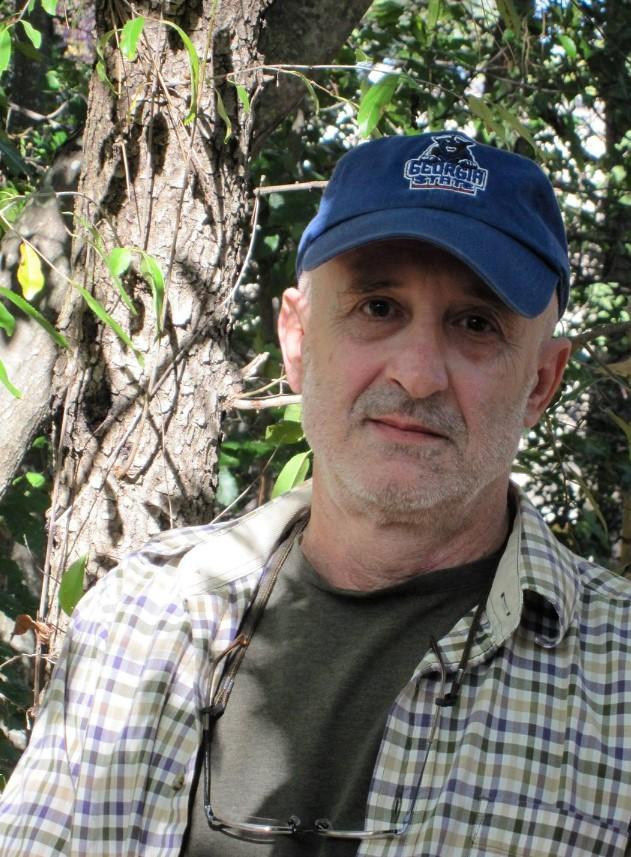
Section Branding
Header Content
Remembering former Georgia Poet Laureate David Bottoms
Primary Content
LISTEN: GPB's Peter Biello speaks with James Davis May about the life and legacy of his mentor, David Bottoms, who died March 10 at age 73.

Former Georgia poet laureate David Bottoms died March 10 at the age of 73. He grew up in Canton, north of Atlanta, and went to Mercer University in the late 1960s. That's where he saw a reading by poet Jim Seay. Here, he recalls the impact of that moment in an interview with the Georgia Writers Hall of Fame.
“I saw in Jim Seay that you could write about the American South,” Bottoms said. “You could write about where you were from. You didn't have to write about Wales. You didn't have to write about Paris.”
Bottom went on to write a lot about his life in the South, publishing 11 collections of poetry and two novels. He also spent part of his career teaching. GPB's Peter Biello spoke with one of his former students, who now teaches poetry and directs the creative writing program at Mercer University, James Davis May.
Peter Biello: Tell me about your experience with David Bottoms as your teacher. When did you meet him?
James Davis May: I met him in 2007. I had come to the Georgia State Ph.D. program to study with him. I remember reading his poems in the University of Houston library, where I was before, and thinking, "Oh yeah, this is — this is the person that I would like to study with."
Peter Biello: Really? What was it about his work that drew you to him in that way?
James Davis May: Well, at the time, American poetry was very cynical and it was sarcastic. And here was someone writing poems that [...] seemed like they were going after important things rather than being maybe too cool to risk feeling or more clever than the reader. These were poems that were trying to reach more significant things.
Peter Biello: I know he wrote a lot about baseball in his poems, and he spoke at readings about not being as good a hitter as a kid as a fielder, so he'd sit in the dugout and read books like War and Peace. But in those poems about baseball, he often had this way of just elevating them to something beyond a baseball poem, whether it's a story about his father or setting a scene that was really just poignant in its own right. But what can you tell us about his skill in elevating those ordinary things into something much more meaningful?
James Davis May: David believed that the purpose of poetry is to find significance in life. And that clip you just played was about how he learned through Southern poetry, looking for the things around him. ... You don't need to go to Paris to — to have a profound experience. You can go into your backyard. And so the background of his poems are Canton, Macon, Marietta, Atlanta. And so his whole idea was: He would tell us in class to "Turn your radio on." This is a phrase from a commercial, I think, a gospel commercial when he was younger. But the idea is the poet has some sort of receiver. And the job of the poet is to look at the world and find the significance in it, to find a deeper meaning.
Peter Biello: It's so funny that he used that because I had a professor in college — I studied fiction — who always said something about having antenna up — an antenna for emotion, and once that emotion becomes clear, follow it. Follow that emotion.
James Davis May: Yeah, absolutely. And so that was the whole idea to just pay attention to the world. And that's why in David's poems, you often see a lot of nature poetry or images from nature, but also a lot of images of his family, his parents, his wife, his daughter.
Peter Biello: So he's written several collections. Which one is your favorite?
James Davis May: So my favorite is We Almost Disappear, which I think it was writing a lot of the poems around the time that I was working with him and the book came out when I was in graduate school. And these are shorter poems and they're really about his family, about finding significance in the world around him.
Peter Biello: In addition to the comment about keeping your radio on, was there a piece of advice that he gave you that continues to help you as you write now?
James Davis May: One piece of advice, just practical advice, as part of being a father: My wife was pregnant my last year of my Ph.D., and we weren't financially sound at the time. And I remember him pulling me aside and he could tell I was very worried. And he pulled me aside and said, "Don't worry, it's all going to be good." And at the time, a lot of the male voices in my life were not exactly enthusiastic about being a father. And in his poetry, but also in just knowing him, he was a real positive voice for being a father, being part of a family. And you see that in his poems as well. But also, I was struck by something he said a little bit more practical to poetry. He said that a poet can't be a nihilist, that a poet always has to have a theological perspective. That doesn't mean the part has to be religious, but the poet has to believe that there's some meaning beyond just what's in front of us, and that it's the poet's job to search for that.

